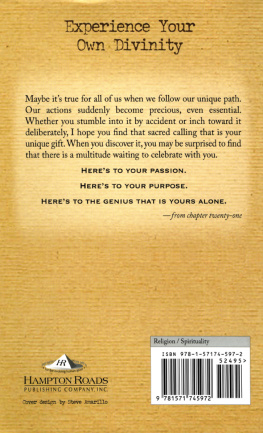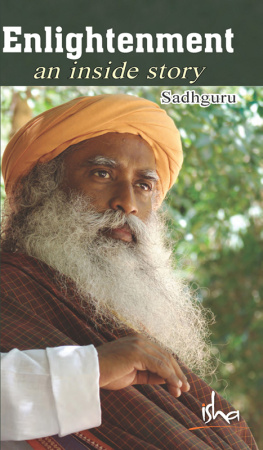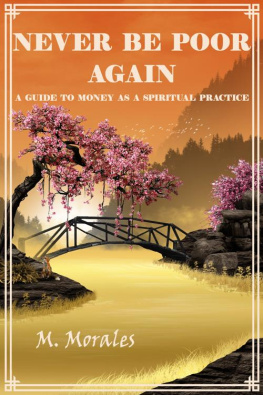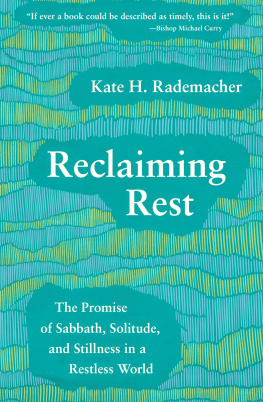ACKNOWLEDGMENTS
So many factors go into birthing a book that it's a puzzle to me who the real author is. Events and ideas seem to be orchestrated by forces great and mundane, visible and mysterious, sublime and ridiculous. There is the lifelong, aching, interior compulsion which dogged me to say something of value. There are also the computer games Solitaire and Minesweeper which raised the crescendo of my self-loathing of procrastination to the point that I had no choice but to start typing.
But most of all there have been the precious people who have encouraged, inspired, and been exceptionally patient over all these years. My wife, Jacquie, has been the one true, steadfast, and guiding spirit. Without her constant gentle reassurance, her unflagging support as she read through countless drafts, and her belief in this project, it never would have come into being.
I also want to thank my children, Sean (Dirt 1), Jesse (Dirt 2), and Stacy (Dirtette 3), for the way they have embraced this strange journey of their father. You will never know how much it has meant that you cared so deeply about the tales of my curious adventures, took the time to read this book, and shared it so enthusiastically with your friends. No better PR could a father ever hope for.
I am extremely grateful to Janis Vallely, my agent, for taking a chance on this unknown author and to Nancy Hancock for recommending me to her. Bob Friedman, my senior editor with Hampton Roads, has been an extraordinary guide who has shown an unusual grace and concern for me and this book.
My editors, Donna Beech (who labored tirelessly from Amsterdam and was an absolute wonder to work with in the early days) and Priscilla Stuckey (who took the wordiness of my manuscript and tightened it with remarkably little pain), were both gifts from the heavens.
To those who made special contributions when this was going to be a self-published book I can never begin to express my gratitude: Peggy and Ted Kemp for reading the manuscript, giving guidance about the publishing industry, and typesetting; my sons, Sean and Jesse, for their ideas and trial cover designs; Stacy and Jacquie for their feedback on titles and design.
There were many key people who read the manuscript, made suggestions, and gave me confidence: Frank DeMarco, John and Susan Rademacher, Mary and Sonny McDaniel, William Twig Branch, Lisa and Michael Tousignant, Laurie Monroe, Karen Malik, Fay and Skip Atwater, Ron Naylor, Barbara Bowen, Darlene Miller, Michael Sinkus, Carolyn and Curt Bartel, John McMichael, Kathy Bryars, Ken Smith, Sue Stickney, Kim Morris, Nancy and Lu Rudolph, Ann Walsh, Danielle Barcilon, and so many others. Please know that if I've forgotten your name, it is only because of the limitations of my memory and not for a lack of gratitude.
ABOUT THE AUTHOR

Paul Rademacher graduated from Princeton Theological Seminary with a master of divinity degree in 1985 and served as a Presbyterian pastor for fifteen years. Currently, he is executive director of The Monroe Institute in Faber, Virginia, world-renowned for the exploration of human consciousness. The building industry has been a major focus in Paul's life, where he has spent many years as a laborer, journeyman carpenter, general contractor, and designer. He is also an acclaimed public speaker, seminar leader, artist, closet musician, husband, and father of three.
Hampton Roads Publishing Company
for the evolving human spirit
Hampton Roads Publishing Company
publishes books on a variety of subjects,
including spirituality, health, and other
related topics.
For a copy of our latest trade catalog,
call toll-free, 800-766-8009,
or send your name and address to:
Hampton Roads Publishing Company, Inc.
1125 Stoney Ridge Road
Charlottesville, VA 22902
E-mail:
Internet: www.hrpub.com

Paul Rademacher graduated from Princeton Theological Seminary with a Master of Divinity degree in 1985, and he served as a Presbyterian pastor for fifteen years. Currently he is executive director of The Monroe Institute in Faber, Virginia, world-renowned for the exploration of human consciousness.
He is an acclaimed public speaker, seminar leader, artist, closet musician, husband, and father of three. He resides in central Virginia.
CHAPTER ONE
A Crack of the Hip and Off to the Twilight Zone
When I was a building contractor the first time around, before I had any thought of becoming a pastor, I learned an important lesson: you have to be out of your mind to work with concrete. There are any number of ways to get concrete where you want itall of them bad. You can shovel it, pour it, wheelbarrow it, dump it, pump it, use a conveyor, crane it, rake it, screed it, trowel it, push it, pull it, or even use a Georgia buggy. But no matter how you do it, the concrete will inevitably extract its pound of flesh, and then some.
It has its own timetable. Once the pour has begun, there's no stoppingno matter whatfor load after load, truck after truck. Just when you think you can't stand anymore, a form breaks, a truck gets stuck, or a load spills. And when that happens, it's nothing but busted knuckles and rivers of sweat to set it right.
Bad days are the best you can hope for in concrete work.
Why would anyone want to make a living this way? If you'd asked my brother and me in 1979, we would've told you it was because we were smart. We were innovative and bold, with cutting-edge ideas.
We started marketing, doing trade shows, sending out flyers. We were on the radio. We were interviewed by the newspaper. We even spoke at the Kiwanis Clubslide show and all.
What we didn't know was that working with concrete is at the bottom of the food chain. So we learned the hard way that, in the concrete business, the best thing you can hope for is a bad day. My wife, Jacquie, had seen the strain on my face when I came home from work. She had witnessed, firsthand, the bruises, cuts, scrapes, and mangled flesh of the concrete business. She had become resigned to work clothes that could only be burned, because they were covered with form oil.
Knowing all this, why would she inexplicably begin praying one day that the concrete pour we had scheduled would go badly? Why would the love of my life, the mother of my children, my confidante, risk sending me, and our company, into the ravages of concrete hell?
She was looking for a sign.
IN SEARCH OF A SIGN
It had all started with the still, small voice.
While teaching Sunday school one day, these words popped into my head: This is what I want you to do. The voice was clear and precise. I knew it was speaking of the ministry. It carried the kind of tone and purpose that made me sit bolt upright in my chair.
However, knowing the cost of such a move, I wasn't about to jump. We already had two children and lived in a community we loved. We were deeply involved in the life of our church. Our extended families were close by, and we wanted very much for our children to grow up around their grandparents. We had just begun building a new house. Going to seminary would have meant leaving all that behind.
After hearing that voice, Jacquie and I were invited to have dinner with our best friends, Steve and Kay. Steve was the associate pastor of our church. While driving to their home, I turned to Jacquie and asked, What would you say if I were to go to seminary? I knew there was no way she would ever agree to such a harebrained idea. After her veto, I could get on with my life and business.
Next page












